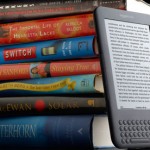Jessica Meszaros/ Contributing Writer
University students are taking part in an overall gravitation towards e-books on college campuses. According to Meaghan Connolly, manager of the Modesto Maidique Campus bookstore, digital textbook sales went up 462 units sold in this year, which is a 54 percent increase from the 2025 units sold in the year 2012; while physical textbook purchases remained the same.
“E-books represent a small percentage of student purchases,” Connolly said.“But one that is growing significantly.”
She noted that as more content becomes available in digital formats, students will continue to test the new technologies to decipher which system makes the most sense for them. 
In 2010, Barnes and Noble launched NOOK Study, a free downloadable software application that provides students with access to over 3 million titles on their NOOKs.
The app can offer students savings of up to 60 percent off of the new textbook price, according to Connolly. Students also get added features, such as the digital library search and course content organizer.
Jennifer Llanos, a junior majoring in dietetics, uses a NOOK for her Nutrition Counseling course. She said that she enjoys the freedom of writing and erasing notes on her NOOK e-book.
“There are certain things you can do with an e-book that you can’t do with a textbook. If you highlight a textbook, you damage [it] forever,” Llanos said.
Barnes and Noble is not the only company putting forth efforts to advance the textbook experience.
According to Angela Pontarolo, communications and social media manager for Chegg, one in four of Chegg’s e-book Reader sessions was on a cell phone in 2012. Chegg is an online based company that specializes in textbook rentals and purchases. They offer physical and digital textbook copies to students.
“Physical textbook purchases and rentals still reign supreme in the market, but there’s a growing fascination and desire to use e-books on platforms like Chegg’s HTML5 e-book Reader,” Pontarolo said.
Students can access the e-book Reader on any connected device. Pontarolo added that students are now utilizing Chegg’s online study tools, like the homework help service and the iOS Textbooks Solutions app.
Lauren Arnold, a senior psychology major, uses two e-books on Chegg. She said that she finds their homework help service useful.
“It’s definitely easier to get in touch with people on [Chegg] than it is here sometimes,” said Arnold.
NOOKs, tablets, laptops and cellphones allow for students to access their required college readings through a variety of new mediums.
Rahiq Noor, a sophomore majoring in sports management, prefers e-books because of fewer books to carry around campus. Noor uses his laptop to read an e-book for his Spanish lab course.
“It’s easier to find stuff. You can just [hit] ‘CTRL F’ and then find everything,” Noor said.
The key word seems to be “convenience” for students.
Freshman biology major, Sara Neuman said that e-books are convenient, but it “feels really different.”
“I’m used to having a textbook that I can touch and learn from,” she said. “It’s your companion [that] you get to write in and highlight things.”
Neuman currently uses a calculus e-book on her tablet, but wishes to have an actual textbook to flip back and easily locate the solutions.
She said her tablet is not all that user friendly for turning pages.
“At least for colleges, I’m seeing [the] move towards e-books. Even my friends who ended up buying a textbook- they all prefer to have that extra copy to be able to carry around with them,” Neuman said.
Journalism and Mass Communication professor Moses Shumow said that e-books have a lot of room for improvement.
“I haven’t seen a lot of e-books yet that are really multimedia in their core- that embed videos, that embed photos, that embed interactive graphics that can lead to a richer learning environment,” said Shumow.
He said that he sees promise in the idea, but that there are many kinks needing to be worked out.
Shumow said, “I would guess that in the next 10 years we’ll see increasing use of tablets in the classroom rather than printed books.”
news@fiusm.com





